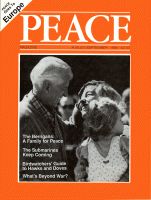
Peace Magazine Aug-Sep 1986, page 23. Some rights reserved.
Search for other articles by PMag staff here
We take pleasure in sharing parts of a letter from an old friend, Professor Nancy Netting, who teaches sociology at Okanagan College in Kelowna, B.C.
Metta,
Since my intro sociology classes were reading your text, Foundations of Modern Sociology, [Prentice-Hall] I shared your Christmas letter with them. I showed Speaking Our Peace. They'd read your interview with Rosalie Bertell, so it all fit together when they saw her in the film and read your comment in the letter that hers was "the best interview in the magazine yet." A few students said they were going to write you and buy subscriptions.
The high point of the course was their "social change project." I asked them to write down three social changes they'd like to see happen in their lifetime, then sign their name. World peace topped most lists (other choices involved ending hunger, racial and sexual equality, environment, free post-secondary education, and the end of smoking.) When I passed back their papers, I announced, "Here is your assignment: Choose one of the social changes on your own list and for the next 7 weeks, do all you can to make it happen. Then write an essay about (1) what you did, (2) the effect you had on the problem, (3) the resistance you encountered, and (4) the effect of this project on you.
They were stunned. (Scared. Surprised.) "This is worse than last term!" said one young woman. "Then, all we had to do was break a norm!" After about a week they'd recovered enough to decide not to drop the course, make a choice of project, and group together with other students. I gave some extra PEACE Mags to the students tackling peace.
Most of the projects involved letter-writing, petitions, calling meetings. Two created a videotape of environmental damage to the forests, several established no-smoking areas in their workplaces, but thanks to one group, KELOWNA IS NOW A NUCLEAR FREE ZONE!
Four students learned that several neighboring communities were already nuclear-free, and that in Kelowna, despite a referendum against nuclear weapons two years ago, no declaration had been made. They decided to ask the city council to declare us nuclear-free. The Kelowna Peace Group gave strategic suggestions: prepare a brief, get signatures on a petition, check the wording of other municipal resolutions...
And so they did: a petition with 400+ signatures, a well-written brief, a few phone calls to lobby councillors ahead of time--and the vote by City Council was unanimous.
We made provincial CBC and all the local papers, and brought favorable attention to Okanagan College ("I didn't know there was a student peace group," said one activist.)
Now all my students--and I--realize that an individual can make a difference. Some of them are inspired to do more ("I'm not going to be a "free-rider" anymore, said one, quoting her text) so I'm very proud. Now they all know the difference between sociology and social action, but the two will be forever linked in their memories.
Love, Nancy.
YOU CAN HAVE BOTH A VACATION AT THE COTTAGE and a course in peace studies! Beginning in September, a correspondence course will be offered by the University of Waterloo on The Roots of Conflict and Violence. Dr. Conrad Brunk will analyze human conflict on both interpersonal and intergroup levels, drawing upon the contributions of social sciences, as well as the humanities, to this analysis. This can be a credit course. Apply for PACS 201 (Peace and Conflict Studies). Address your inquiries to Correspondence Studies Program, University of Waterloo, Waterloo, Ont. N2L 3G1, or call 519/888-4050.
If your local university or community college does not offer peace courses, launch a local campaign to start them. Encourage all teachers to subscribe to PEACE Magazine and use it in their classrooms.
IF YOU PREFER TO GET YOUR EDUCATION AT CONFERences, you could attend:
The fourth North Atlantic Network Conference, to be held in New York City, August 22-24, hosted by the Mobilization for Survival. Participants are expected from the Pacific, Arctic, Caribbean, Europe, Canada, and elsewhere. The conference will focus on developing international strategies for challenging the militarization of the oceans and promoting Nuclear Free Ports.
The Mobilization is also sponsoring a National Weapons Facilities Organizers Strategy Conference, September 13-14, in San Francisco, to bring together activists working on campaigns directed at weapons contractors and military bases. For more information on either conference, contact Mobilization for Survival, 853 Broadway, Room 418, New York NY 10003 or phone 212/533-0008.
Also, see B.C. notes for a course in Nelson, B.C.
"Approaches to Peace Education"
Selections from Inter-University Workshop Peace Education. Papers by Conrad Brunk, Brandt Chamberlain, George Lopez, Theodore Olson, Anatol Rapoport, Douglas Ray, Joanne Santa Barbara, Metta Spencer. Two Inter-University Workshops have been held in Southern Ontario for people who teach at the post-secondary level, either in peace education courses, or who can add peace materials to other curricula. The collected papers are available for $12.00, prepaid from Peace Research Institute-Dundas, 25 Dundana Ave. Dundas Ont. L9H 4E5
"Nuclear War: Philosophical Perspectives"
This collection, edited by Michael Allen Fox and Leo Groarke, includes philosophical papers by prominent scholars, who address such issues as nuclear delusions; the individual and the state; the environment, conceptual and psychological dilemmas; and the pursuit of peace. Commentaries are provided to provoke classroom discussion. Price: U.S. $23. Contact Prof. Michael Allen Fox, Dept. of Philosophy, Queens University, Kingston, Ont. K7L 3N6.
Instructors who wish to use PEACE Magazine in classrooms can order it in bulk for the usual rates --$1 per copy for orders of 20 or more.

Peace Magazine Aug-Sep 1986, page 23. Some rights reserved.
Search for other articles by PMag staff here